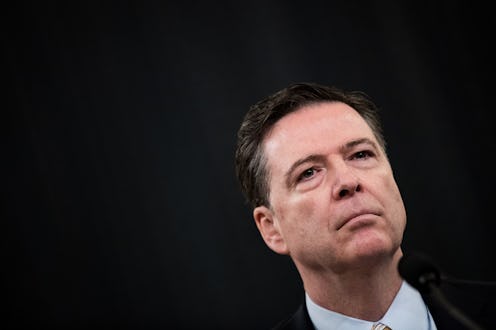
During a Monday morning hearing before the House Intelligence Committee, FBI Director James Comey publicly rejected Donald Trump's wiretapping allegations against Barack Obama. His testimony followed reports from earlier this month that Comey had asked the Justice Department to reject Trump's claims because they implied that the FBI had broken the law.
The wiretapping controversy that was discussed during the hearing unfolded when Trump took to Twitter to accuse Obama of tapping his phones during the election process, going so far as to draw a comparison to the Watergate scandal. Rep. Adam Schiff, the most high-ranking Democratic official on the House Intelligence Committee, reportedly expected Comey to agree with him that Trump's claims were "patently false." Monday's hearing proved that this was indeed Comey's stance on the issue.
"With respect to the president’s tweets about alleged wiretapping directed at him by the prior administration, I have no information that supports those tweets, and we have looked carefully inside the FBI," Comey told Schiff. Comey also said that the Department of Justice and all of its components similarly had no information to support Trump's claims.
Furthermore, Comey rejected the president's claims that Obama or the FBI had engaged in McCarthyism.
"I try very hard not to engage in any -isms of any kind, including McCarthyism," Comey said.
Comey also clarified that contrary to Trump's claims, no president — including Obama — could legally order a unilateral wiretap of anyone:
I can tell you in general, as [Adm. Mike Rogers, director of the NSA] and I were just saying, there is a statutory framework in the United States under which courts grant permission for electronic surveillance either in a criminal case or a national security case based on a showing of probable cause, carefully overseen. It’s a rigorous, rigorous process that involves all three branches of government and it's one we've lived with since the late 1970s.
According to ABC, House Intelligence Committee Chair Devin Nunes said on Sunday that "we know there was not a physical wiretap of Trump Tower." However, NBC reported that Nunes remained concerned about "other surveillance activities," notably communication leaks pertaining to former National Security Adviser Michael Flynn.
Comey's testimony — which marked his first time speaking publicly on the issue — was part of an ongoing investigation by the House Intelligence Committee into Russia's involvement in the American presidential election. During Monday's hearing, Comey said that the FBI is indeed conducting its own investigation into Russian interference, and confirmed reports that this investigation has also looked into possible links between Trump's campaign team and Russian officials.
“Because it is an open ongoing investigation and is classified, I cannot say more about what we are doing and whose conduct we are examining," Comey added.
After Comey confirmed multiple times that neither the FBI nor the DOJ had any information supporting Trump's wiretapping allegations, Schiff asked Adm. Rogers — who also testified at the hearing — if he or the NSA had ever asked their British counterparts to wiretap Trump on Obama's behalf.
Rogers denied such claims, which have been employed by the president and White House Press Secretary Sean Spicer to explain why no evidence has been found to support Trump's wiretapping allegations. Moreover, Rogers also added that he had seen no evidence that anyone else in the NSA or the Obama administration had made such a request.
Now that Comey and Rogers have both rejected Trump's allegations that Obama wiretapped him, it remains to be seen whether Trump will withdraw his allegations.